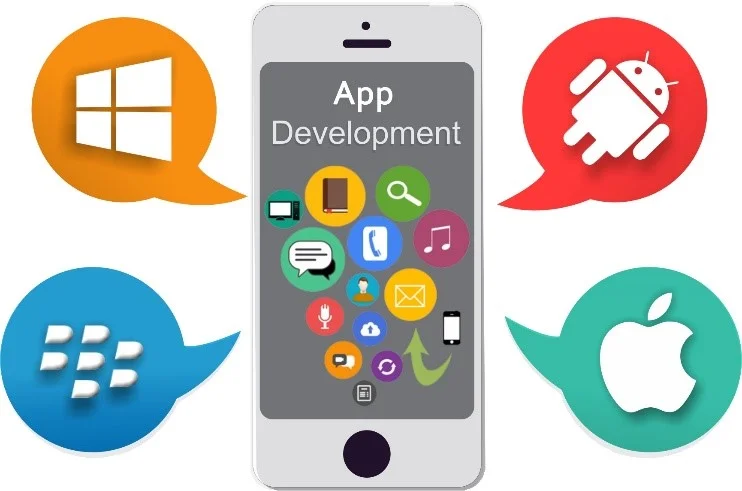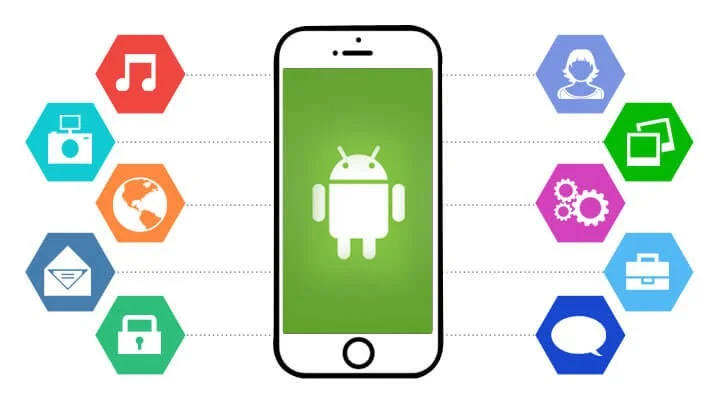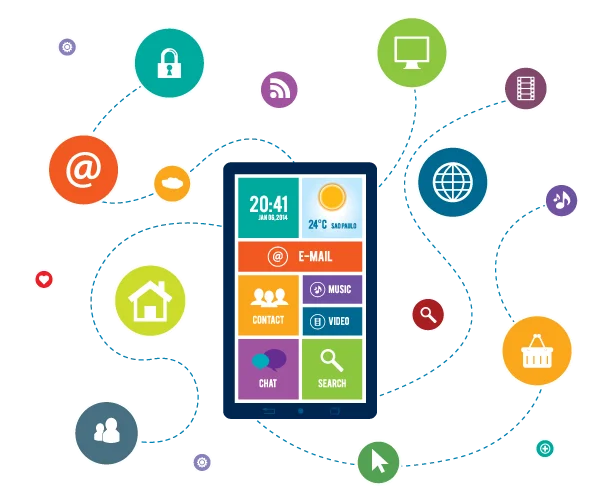Mobile App Development
INTRODUCTION:
Telkoware has vast experience in developing high performance, digitally transformational and fully packed native, hybrid, and cross-platform mobile app on iOS and Android. Companies choosing us for building their customized mobile apps are confident that their final product will be highly secure, scalable, reliable, and adaptable to any environment they are hosted on. We handle the entire life cycle of mobile app development process: Planning and Strategy, UX/UI Design, App Development, QA/User Acceptance Testing, and Delivery.Android v.s. iOS:
We do mobile app development for iOS and Android operating systems, since Android controls about 88% (Q3, 2016) of the mobile device market worldwide, and Apple owns most of the remaining market share.


Native Mobile App Development:
We use Swift or Objective-C to write native iOS apps, and Java to write native Android apps.
Advantages of Native apps:
– fast & responsive
– easy to tap into wider functionality
– match UI/UX to platform conventions
Cross-platform Native Mobile App Development:
In order to build one mobile app that works on iOS as well as Android in native app style, we use Xamarin. Made by Microsoft, Xamarin is a platform that lets developers build one app that works on multiple platforms in C#. They also provide free tools to build, test, distribute, and learn from your apps.


Hybrid Mobile App Development:
If your goal is to put something usable into your users’ hands as quickly as possible and you are short on resources, but need to create a simple version of mobile app that still provides value, then hybrid mobile app development is the right technology for you. In the startup world, this is called an MVP, or minimum viable product.
A hybrid mobile app is installed like a native app, but it’s actually a web app on the inside.
Hybrid apps, like web apps, are built with Javascript, HTML, and CSS and run in something called Webview, a simplified browser within the mobile app.
Please contact us today for a free consultation at +1(437)223-1771 or info@telkoware.com
Our Process for Mobile App Development
We follow a streamlined process for mobile app development, to ensure that the quality of final product exceeds your expectations and is delivered within the allocated budget and before the deadline.
Here are the 5 steps of our mobile app development process:
1. Define project details
There are some important project details that need to be defined in the beginning:
⦁ Who is the target audience?
Understanding the target audience is key for success. Do some research to figure out the ideal persona of the mobile app user.
⦁ How much is the budget?
Budget plays a significant role in deciding what mobile platform to use (native, hybrid, web, or cross-platform native), level of features and functionalities within the mobile app, and any monetization method
⦁ What’s the deadline?
Is there a strict deadline to abide by? If so, then it will have an impact on the decision for mobile platform, level of functionality, resources, 3rd party integrations with other applications, etc.
⦁ Requirements document
It is a detailed document, explaining how mobile app should work and the features and functionalities it contains.
2. Design a rough sketch
The 1st step in designing is drafting a rough sketch. Here, you are laying down the foundations of your main features and how the interface is going to work

Don’t worry if the sketches don’t look amazing. The purpose of this exercise is to help the team understand where the app is headed.

3. Storyboarding
The purpose of a storyboard is to visually show how each screen will flow from one to the next, and how your users will navigate through your app.
For example, see below an example of an on-boarding flow: users will navigate from splash screen, to sign-up screen to home screen etc.

4. Wireframing / Prototyping
Wireframing is the process of creating a mockup or prototype of your app. You can find a number of prototyping tools online. The most popular ones are ‘Sketch’, ‘Balsamiq’, ‘Proto’, Invisionapp’, which allows you to not only drag and drop all screens in a specific flow, but also add button and swipe functionality so that you can click through your app.

This prototype will not have any back-end development, so the purpose is to click on different buttons and explore screens and menu. It is important to review the prototype and provide feedback than to wait once the mobile app is developed, which will be costlier and more time-consuming.
5. Back-End Development
Now that the mobile app has been clearly designed, it’s time to get started on the backend development. Developer will not only do the coding, but also set up servers, databases, APIs, and storage solutions.
Then back-end code is integrated with front-end application, along with the database to store user information and product information.

6. Testing
Mobile app is tested thoroughly with multiple users to identify and remove any bugs or glitches.
On Android, it is easy to install your app file (apk file) on a device to test its functionality in a live environment. iOS is different—there you will require a platform like TestFlight to download and test your app (api file).
This step is the last step in the mobile app development process.
7. Launch
Now it is finally time to deploy the mobile app on Google playstore and Apple Appstore.
It is important to sign up for developer accounts at the app marketplaces you are developing for. Getting your account approved may take several days (depending on the platform) and shouldn’t be put off to the last minute.
When it comes to publishing a new app, Google and Apple have different policies. Google does a brief review and will pass the app in a few days. Apple does a detailed review before it approves the app to be published. There is no set timeframe for this, but you can expect at least a week to 10 days before they will get back.
To overcome this delay and to get feedback from early adopters, the mobile app can be submitted to PreApps, which is a popular app marketplace.
It is important to make sure that for all mobile app marketplace, a short and long description of the mobile app is provided that is informative and compelling. Also, take high-quality screenshots that shows key features of the app.
Your mobile app is all set for users to download and start using it.

FAQs
Hey there! Thinking about building a mobile app? That’s an exciting step, whether you’re a startup founder with a big idea, a business owner looking to innovate, or a CTO ready to lead the charge. We know you have a lot on your mind, so we’ve put together some of the most common questions we hear, with friendly, no-nonsense answers to help you navigate the journey.
That’s the most important question to ask! A mobile app is a powerful tool, but it’s not a silver bullet. It’s the right move if you’re looking to:
- Solve a specific problem for your customers or team that a website can’t.
- Increase customer loyalty and engagement through push notifications and a dedicated user experience.
- Create a new revenue stream through in-app purchases or subscription models.
- Automate or streamline a core business process.
A quick chat with our team can help you validate your idea and determine if an app is the best path to your business goals.
We build iOS apps, Android apps, and cross-platform apps (using frameworks like React Native and Flutter). Whether you need a customer-facing app, an internal business tool, or a full eCommerce platform, we can bring it to life.
Great question! This is a key decision that impacts cost, performance, and timeline. Here’s the simple breakdown:
- Native Apps: Built specifically for either iOS (using Swift/Objective-C) or Android (using Java/Kotlin). They offer the best performance, speed, and can fully leverage device features like the camera or GPS. They are perfect for high-performance apps and projects with complex functionality, but they require building and maintaining two separate codebases.
- Cross-Platform Apps: Built once with a single codebase that works on both iOS and Android. We use platforms like Flutter or React Native to deliver this solution. This approach is more cost-effective and faster to get to market, as you don’t need to build two separate apps. It’s an excellent choice for a wide range of business applications.
- Hybrid Apps: These are essentially web applications packaged to look and feel like a mobile app. They are the fastest and most budget-friendly option, ideal for simple apps focused on content and quick delivery.
We’ll help you weigh the pros and cons to choose the technology that perfectly aligns with your budget, timeline, and goals.
Not always! If you want the best performance and platform-specific features, native apps (built separately for iOS and Android) are ideal. But if you want faster development and cost savings, cross-platform apps let you run on both platforms with one codebase. We’ll help you decide what’s best for your business and budget.
This is the big one! The cost of a mobile app is highly dependent on its complexity, just like building a house. A simple app with a few features will be significantly different in price from a complex app with user profiles, payment gateways, and real-time data. A basic app might start around $10,000–$15,000, while more advanced apps with custom features, APIs, or eCommerce can range $50,000+. We’ll always provide a detailed proposal upfront, so you know exactly what you’re investing in. Our goal is to provide a powerful solution that delivers a strong return on your investment, not a surprise bill down the line.
Like cost, the timeline depends on your app’s complexity. A simple app can be ready in a few months, while a more complex, feature-rich application can take much longer.
- Simple apps: 2–3 months
- Mid-level apps: 4–6 months
- Enterprise-grade apps: 6–12+ months
We work in agile sprints, so you’ll see progress along the way, not just at the end.
Here’s how we usually work:
- Discovery & Strategy – We define project goals, users, features, and the target audience.
- UI/UX Design – We create the user flow and design a beautiful, intuitive interface.
- Development – Our Canadian-based developers write the front end code, back end code, and complete all necessary integrations.
- Testing & QA – We perform rigorous testing across devices to ensure it’s bug-free and secure.
- Launch & Ongoing Support – We’ll help you get your app onto the app stores and provide ongoing maintenance and support to keep it running smoothly.
Absolutely! Many clients come to us with just a concept. We’ll help you validate the idea, define features, and create an MVP (Minimum Viable Product) to test the market before you invest heavily.
Yes! Launch is just the beginning. We offer maintenance packages that include bug fixes, OS updates, feature enhancements, and performance optimization—so your app stays fresh and competitive.
We handle the entire design process, from wireframes to polished UI/UX design. Our designers focus on creating apps that are not just visually appealing but also easy and intuitive for your users.
Definitely. We can connect your app to your CRM, ERP, eCommerce platform, payment gateways, or any third-party APIs—so everything works seamlessly together.
Yes! Many businesses want both—a mobile app for customer convenience and a web app for accessibility on desktop. We can build both in parallel, ensuring consistent branding and user experience.
We take security very seriously. We integrate security best practices directly into our development process from the beginning. Our team builds applications with robust data protection, secure API integrations, and continuous testing to safeguard against vulnerabilities. We follow industry best practices for security—data encryption, secure APIs, authentication, and regular code reviews. For industries like finance or healthcare, we also build apps compliant with HIPAA, GDPR, or PCI DSS.
Of course! Submitting an app can be a complex and sometimes frustrating process, especially with Apple’s strict review guidelines. We’ll handle the entire process for you, from preparing the app store listings to navigating the approval process. We also manage app store assets like screenshots, descriptions, and keywords. We’re here to make sure your app gets into the hands of your users without any hassle.
Absolutely! We love working with startups to build MVPs and help them scale, and we also partner with mid-sized businesses and enterprises on complex, mission-critical apps.
You’ll get a dedicated project manager who shares regular updates, sprint reviews, and progress reports. We use tools like Slack, Jira, or Teams to keep communication smooth and transparent.
We’ve developed apps for retail, healthcare, finance, logistics, construction, education, and non-profits. Each app is customized to fit the industry and audience.
We get it—you have a lot of options. Here’s what makes Telkoware different:
- Local, In-House Expertise: We’re a 100% Canadian-based team. We never outsource our work, so you’re working directly with our local, reliable experts aligned with your time zone from the first call to the final launch.
- Strategic Partnership: We’re more than just coders. We act as a strategic partner, helping you refine your idea and build a solution that truly solves a problem and drives business growth. We don’t just code; we build apps that drive ROI.
- Full-Service Digital Agency: We also offer web design and digital marketing. This means we can help you with every aspect of your digital presence, ensuring your app, website, and marketing strategy are all working together seamlessly.
You do! When you work with Telkoware, you own all the intellectual property (IP) and the source code for your mobile app. We believe in providing you with full ownership and control, so you’re free to update, modify, or add features as your business grows.
Easy! Just book a free consultation with us. We’ll walk through your goals, help shape your app strategy, and give you a clear roadmap with timelines and costs.



